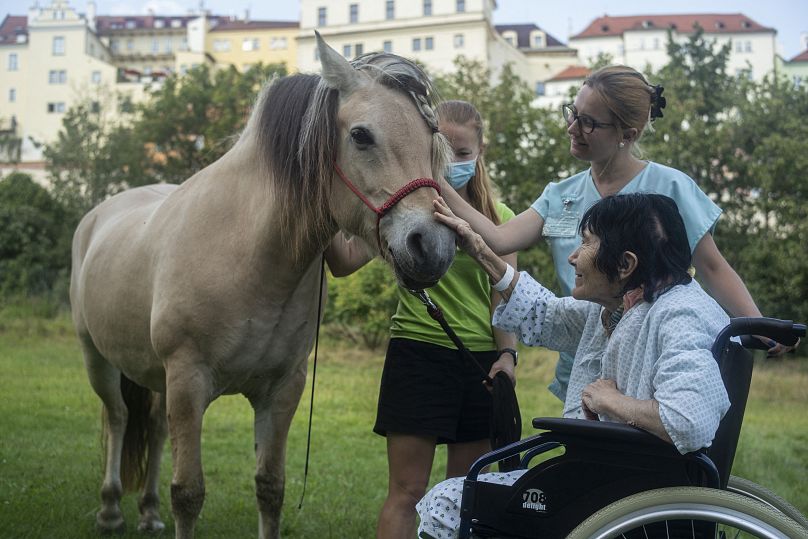Cuba's National Zoo runs animal therapy sessions using endangered species, but PETA says the programme is harmful and dangerous.
The National Zoo of Cuba has been offering animal therapy with exotic and endangered species to children with disabilities. But animal rights organisation PETA says that the programme is harming the animals.
 ADVERTISEMENT
ADVERTISEMENT
 ADVERTISEMENT
ADVERTISEMENT
Jaguar cubs and endangered Cuban tree boas are among the exotic animals that parents and teachers say provide unusually effective therapy to Cuban children with special needs.
In Havana, the Zoo Parque Zoologico Nacional welcomes children with Down's syndrome, autism and other special needs to pet the jaguars and play with their paws, stroke the cool, moist skin of snakes and give milk to a zebu cow.
"Apart from breaking barriers of fear...it also encourages them to care for and protect the environment," says zoo development director and animal therapy specialist Yaima Pueblas.
The teachers and the parents say that the programme has been providing a bright spot for the children during a particularly tough time on the Caribbean island, which has been hit hard by the coronavirus pandemic.
"They have gradually advanced in school," says special needs teacher Maraidis Ramirez. "They did not write; now they make the 'a', they write '1'."
Javier Lavaumena says the programme has changed the direction of his son's life. "We have seen great achievements with the children...they have made many changes in their lives, at school and at home. They come home with different behaviour," he says.
What is the real use of animal-assisted therapy?
Animal-assisted therapy or zootherapy aims to improve physical and mental health. It has been used to teach autistic children how to communicate and have relationships and to bring older people out of isolation and stimulate gross and fine motor skills.
While the parents and teachers are seeing the children in Havana happier and more motivated, it is hard to actually measure the real clinical effects of animal-assisted therapies.
The majority of published studies indicate therapy animals can have a limited but positive impact on a range of disorders. However, as researcher Hal Herzog pointed out in Psychology Today, the studies that do not show positive results are hardly ever published.
While nobody can deny that stroking a dog or bonding with a horse can help reduce stress and anxiety, zootherapy has been widely extended to other species. And while therapy dogs are specially trained to take part in therapy and cope with the stress that comes with it, wild animals could suffer lasting damage by being involved with humans at this level.
What about animal welfare?
Exotic animals shouldn't be involved in therapy programmes, says animal rights organisation PETA.
"PETA opposes the use of any exotic animals in therapy programmes," the NGO told Euronews Green. They also shared some of the potential animal welfare violations that can take place during animal therapy.
"For example, monkeys, given to paraplegics often have their teeth removed, are sometimes made to wear electric-shock collars, and are kept caged and in isolation when not in service, which is very upsetting to intelligent, social creatures," says the NGO.
"Dolphin-assisted therapy, in which disabled people swim with dolphins, results in the imprisonment of wild dolphins in tiny tanks, where they are separated from their families while forced to interact with humans. Captive dolphins often die far short of their expected life spans of 40 or 50 years in the wild."
PETA finds that the programme described at the Cuba National Zoo is likely resulting in serious welfare problems for the animals. In order for the public to interact with juvenile jaguars, for instance, the cubs are removed from their mothers within days of birth and given to humans to be hand-raised in an attempt to habituate them to human contact. These vulnerable infants have weak immune systems and being handled by groups of children exposes the cubs to illness, infection, and injury.
The snakes involved are probably struggling with stress and discomfort too. PETA says that reptiles do not display signs of stress and discomfort like other species do, but they’re particularly sensitive to noise and vibrations, and their welfare needs are often overlooked.
The organisation also highlights that direct contact between members of the public and any exotic animal exposes the person to danger too. The animals can become aggressive due to the stress involved and they can also transmit illnesses to people.
Watch the video above to see how the children interact with animals in the National Zoo of Cuba.











